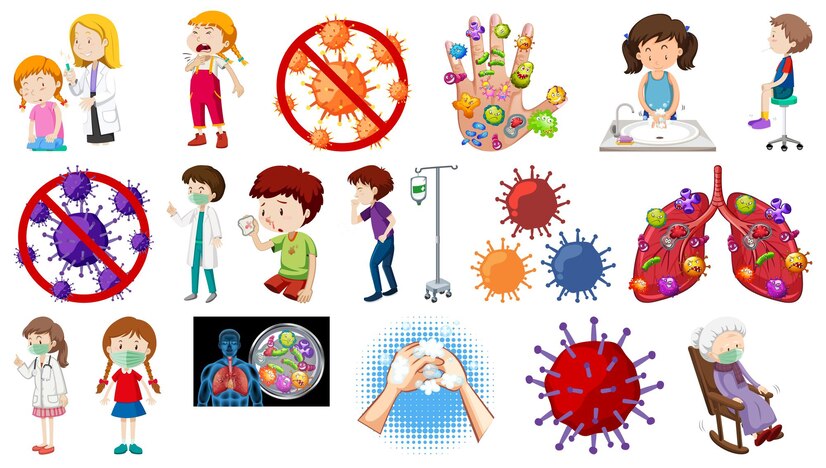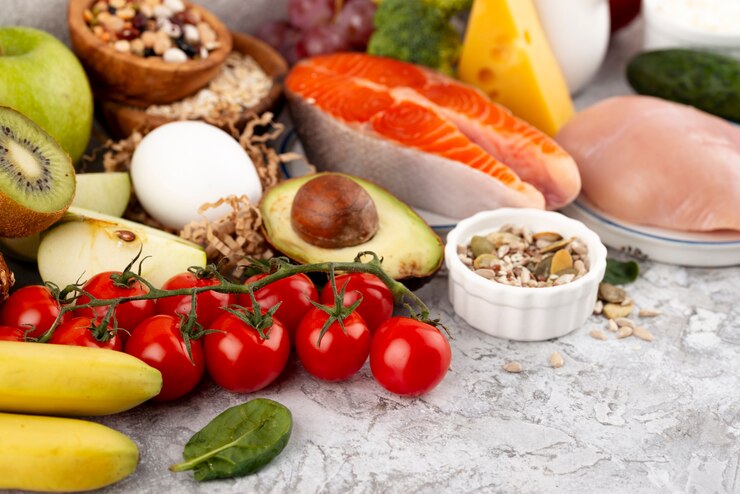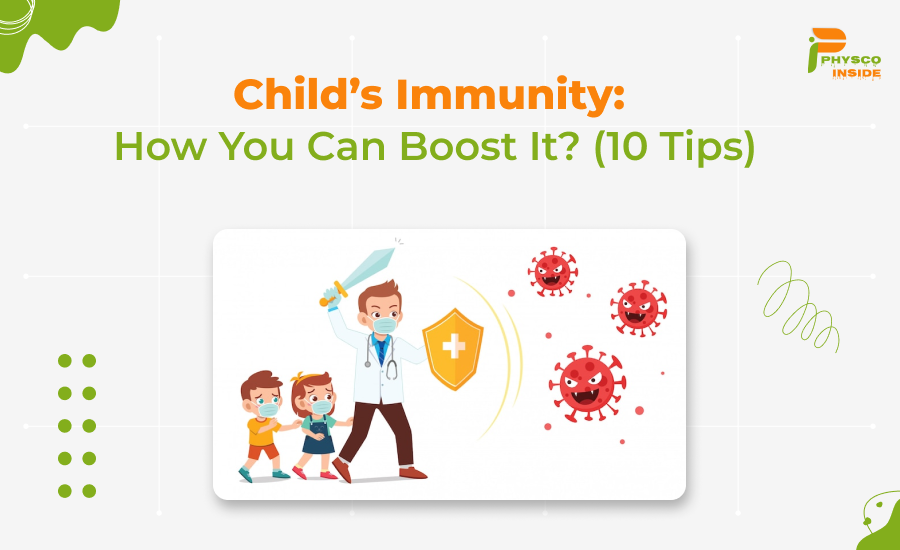Introduction
Child’s Immunity is one of the most keen matters of interest for the parents of modern times. The reason behind is the busy schedule of parents. Due to this, they can not pay attention to their Children’s habits. Due to this, their children might face immunity Barriers at an early stage and vice versa. So to provide an Informative solution to this intent, I am writing this blog article. This blog article will describe you In-depth knowledge about immunity, its Significance, and some highly Recommended ways or tips to boost the affected immunity of your Child. These tips or ways are easy to adopt if one pays proper attention to them. A famous Quotation is ” Better the early stage (Childish), Best will be the Future(Old-Age)”.

What is Immunity?
Immunity is the body’s regular defense system planned to defend or protect against harmful Invaders, like Bacteria, viruses, and other Pathogens. This unique system of the body includes different organs, cells, and Proteins Cooperating to protect the body’s health.
What is the Significance of Immunity for Body?
1 Disease Resistance ability
The vital task of Immunity is to prevent and fight against Diseases. White Blood Cells (WBCs), Antibodies, and other immune Components act as Attentive Protectors, Identifying and killing Microorganisms before they can cause illness.
2 Tissue Repair and Homeostasis
Immune responses play a vital role in tissue repair and Maintaining the body’s internal Ecosystem. Inflammatory Processes started by the Immune system Contribute to Remedial and recovery.
3 Flexibility and Memory
Immune memory cells allow the body to observe and Recollect recently experienced Microorganisms. This Flexibility guarantees a quicker and more Energetic reaction upon Subsequent Exposures Presenting a long-term defense.
4 Malignant Growth (Cancer) Investigation
The immune system is Fundamental in Identifying and Eliminating Abnormal cells, including those with Malignant potential. Immunological Inspection prevents the development and spread of cancer.
5 Cellular Cooperation
The immune system involves a coordinated effort among different immune cells, like Lymphocytes, B cells, and Macrophages. These cells communicate and line up to stand as a fighting or Protective shell against Pathogens.
So after getting knowledge about the base of immunity, now it becomes easy for you to understand the impact of the following tips for your desired search intent.
What are the Tips to Boost a Child’s Immunity?
Follow are some of the child immunity booster foods and other natural ways to improve the immunity system of your Child.
(1) Balanced Diet
A Balanced diet is a dietary routine that gives the Essential Nutrients in the right amount to meet individual optimal health and Well-being. It includes various food Varieties, like Fruits, Vegetables, Lean Proteins, Whole grains, and Dairy, Promoting overall Well-being by Supporting optimal physical and mental health.

(1.1) Fruits and Vegetables
(1.1.1) Example Sources
(1.1.2) Nutrient-Rich Capitals
These Fruits and Vegetables provide Essential Nutrients, including L-Ascorbic Acid, vitamin A, and Antioxidants. These Nutrients are critical in Sustaining the immune system, Upgrading the development of white blood cells (WBCs), and supporting overall immune function.
(1.1.3) Relation with Child Immunity Booster Term
The presence of different kinds of Nutrients in Vegetables and Fruits is very beneficial for the immune health of the child and directly interferes with the future performance of that individual.
(1.1.4) Inclusion into diet
Adding a Colorful variety of Fruits and Vegetables into a child’s diet is a Fundamental and Delightful method for helping resistance and Advancing long-term well-being. So Consuming a Balanced diet takes you away from many of the diseases.
(1.2) Protein: Building Blocks for Immune Strength
(1.2.1) Protein Sources:
Include a variety of Protein-rich foods in your child’s diet.
(1.2.2) Relation with Child’s Immunity Booster:
(1.2.2) Inclusion into Diet
Adding different protein sources into a kid’s eating routine is critical for cultivating a strong immune system, advancing ideal development, and advancing general health or well-being.
(1.3) Whole Grains: Nutrient-Rich Sources
(1.3.1) Examples of Whole Grains
Whole grains are rich sources of some key nutrients, including fiber, vitamins, and minerals. Examples include Brown rice, Quinoa, Oats, Grain, Whole wheat, and Bulgur.
(1.3.2) Nutritional Significance
Whole grains contain a variety of nutrients essential for overall health. Fiber supports Gut health, while vitamins like B and E and minerals like zinc and iron add to the body’s proper functioning.
(1.3.3) Relation with Child’s Immunity Booster
An eating routine associated with Whole grains gives a different kind of nutrients that assume a crucial part in supporting a child’s immune system. The vitamins and minerals contribute to immune cells’ production and capability, advancing versatility against contaminations and illnesses.
(1.3.4) Inclusion Into Diet
Integrating Whole grains into a kid’s eating routine leads to improved kid’s overall health and improves the immune system’s capacity to fight against outer dangers.
(2) Vitamins and Minerals for Immunity
(2.1) Vitamin C
Vitamin C, or L-ascorbic acid, is richly found in various fruits and vegetables, serving as essential components of a child’s diet.
(2.1.1) Sources of Vitamin C:

(2.1.2) Relation with Child’s Immunity Booster:
L-ascorbic acid or vitamin C is a vital participant in advancing the Immune System’s usefulness. It advances the creation of white platelets and antibodies, crucial for fighting contagions. As a powerful Antioxidant, it likewise shields immune cells from harm, contributing to overall immune resilience in children.
(2.1.3) Inclusion into diet
Integrating these L-ascorbic acid-rich food varieties into a youngster’s eating routine backs up their Immune system, making it a basic part of a large-scale way to deal with supporting Immunity.
(2.2) Vitamin D
(2.2.1) Sources of Vitamin D:
Vitamin D is obtained through different sources, basically:

(2.2.2) Relation with Child’s Immunity Booster:
Vitamin D plays a crucial part in supporting a kid’s Immune System. It improves the creation and capability of immune cells and provides immunity against particular diseases. Sufficient vitamin D levels add to a reasonable safe reaction, crucial for the overall well-being of children.
(2.2.3) Supportive note
Confirming a child obtains adequate vitamin D, either through sunlight or dietary sources, is essential to stimulating their immune defenses and fostering long-term well-being.
(2.3) Zinc: A Key Element for Child Immunity
(2.3.1) Zinc Sources

(2.3.2) Relation with Child Immunity Booster
(2.3.3) Supportive note
So having enough amount of zinc portion in a balanced diet for your child is very important because the mentioned above details fully support it in the context of an immunity booster.
(3) Probiotics
(3.1) Sources of Probiotics:

(3.2) Relation with Child’s Immunity Promoter:
(3.3) Inclusion Into Diet
Integrating probiotic-rich food sources into the diet of a child can be a successful technique to help general well-being and secure strength.
(4) Hydration
(4.1) Importance of Hydration
Proper hydration is vital for overall health like helping in digestion, circulation, and temperature regulation. In children, maintaining adequate hydration is particularly essential for their growing bodies.

(4.2) Sources of Hydration
(4.3) Relation with Child Immunity Booster
Hydration upholds immune capability by ensuring the ideal course of immune cells and aiding in the elimination of toxins. Well-hydrated kids are better prepared to oppose contaminations, adding to a strengthened immune system.
(4.4) Supportive note
In summary, Adequate Hydration from various sources is essential for maintaining a child’s immune health and overall Body Health.
(5) Adequate Sleep & Child Immunity

(5.1) Importance of Adequate Sleep
Quality rest is fundamental for a child’s physical and mental development. It maintains mental capability, close to emotional prosperity, and general development.
(5.2) Immune Function and Sleep
During rest, the body goes through vital fix and recovery processes. The immune system is particularly active, producing infection-fighting proteins and cells.
(5.3) Relation with Child Immunity Booster
Adequate sleep is a potent booster that helps in boosting children’s immunity. It improves the production of antibodies and cytokines, critical components of the immune response. Children who consistently get enough sleep are better prepared to defend against infections, promoting a resilient immune system.
(5.4) Supportive note
Generally, focusing on satisfactory rest for youngsters cultivates solid improvement as well as fills in as a characteristic and successful system for building up their resistant immunity.
(6) Childhood Vaccinations
(6.1) Define
The term related to getting the vaccine is called Vaccination. The vaccine is a planned dose of weak live pathogens that are intentionally injected into the body for future correspondence. These weak pathogens build immunity cells that can fight against future diseases if affected by the strong pathogens.

(6.2) Sources of Vaccines
(6.3) Examples of Vaccines
(6.4) Relation with Child Immunity Boosters
(7) Limit Sugar and Processed Foods
(7.1) Sugar’s Effect on Immunity
Excessive sugar utilization is connected to immune system dysfunction. High sugar consumption can weaken the function of white blood cells (WBCs), and diminish the body’s ability to fight against infections or diseases.
(7.2) Processed Foods and Immune Response
Processed food sources frequently contain added substances, additives, and bad or unsaturated fats that can add to infection and deteriorate immune function in children.
(7.3) Examples to Avoid

(7.4) Relation with Immunity Boosting
Reducing sugar and processed food consumption supports a better immune system. nutrient-rich diet encourages the progress and purpose of immune cells, enhancing the body’s natural resistance against infections in children.
(8) Stress Management & Child’s Immunity
(8.1) Sources of Stress
Environmental Factors
Social Factors
Academic Pressure
(8.2) Stress Management Policies
(8.3) Relationship
(9) Hand Hygiene

(9.1) Importance of Hand Hygiene
Hand hygiene serves as a fundamental practice in boosting children’s immunity, going about as a significant interference against infections and diseases.
(9.1.1) Preventing Pathogen Transmission
Appropriate handwashing limits the spread of unsafe microbes, reducing the risk of diseases that could compromise kids’ Immune systems.
(9.1.2) Early Immune Development
If you teach your children about the importance of hand hygiene at the early stage of life, then they will become stronger in the future related of their immunity. Over time this immunity gets exponential power to defend.
(9.1.3) Immune Support in Childcare Settings
Thorough hand cleanliness rehearses in schools and childcare settings establish an environment that supports ideal immunity in kids.
(9.2) Supportive note
Boosting regular hand hygiene not only prevents instant infection attacks but also plays an essential role in stimulating a child’s overall immune power.
(10) Regular Exercise

(10.1) Significance
Regular exercise plays an essential role in improving a child’s immune system which contributes to overall health and ailment resistance.
(10.1.1) Actual Versatility
Regular exercise advances the development of white blood cells and antibodies, supporting the invulnerable reaction against infections.
(10.1.2) Immuno-modulation
Regular exercise has immunomodulatory impacts, adjusting insusceptible capability and diminishing the gamble of chronic inflammation.
(10.1.3) Stress Reduction
Regular exercise alleviates stress, a component known to weaken the Immune system. Reduced stress levels support the best immune function in children
(10.2) Supportive note
Encouraging Regular Physical Activity in kids cheers actual health as well as goes about as a powerful immune booster, strengthening the body’s defense mechanisms against different harmful microorganisms.
Conclusion
After a complete review of this blog article, it proved that Child’s Immunity is directly associated with the above-mentioned ways. So try to achieve all the possible ways to get maximum results for enhanced immunity functioning. And the pro tip is to adopt a Balanced Diet at least.
Frequently Asked Questions (FAQs)
Inspiring Good Hygiene Practices, including regular handwashing, and minimizing stress through activities like play and relaxation, also play a role in supporting a child’s immune system.
Answer: SUNMUNE Syrup and Dabur’s ImuDab Syrup are Recommended.
Pre-Schoolers need 10-13 hours
School-age children need 9-11 hours
Teenagers require 8-10 hours
Answer: Fat-soluble Vitamins like A, C, D, and E, along with minerals like Zinc and Selenium, are crucial for a strong immune system. These can be obtained from a well-balanced diet.
Answer: Foods rich in ANTIOXIDANTS, such as Berries, Citrus fruits, Leafy Greens, and Yogurt with Probiotics, can play a vital role in developing a healthy immune system.
Answer: Regular physical activity is linked to a stronger immune system. It helps in the production of Immune cells (Lymphocytes (T cells, B cells, and NK cells), Neutrophils, and Monocytes/ Macrophages) and improves overall health, reducing the risk of infections.


